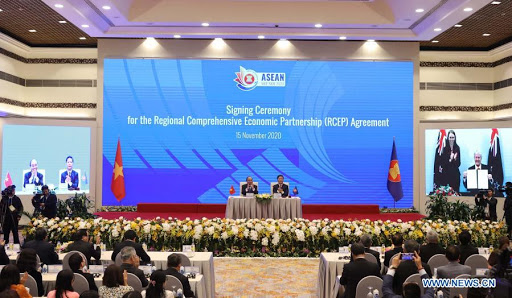20 NOVEMBER 2020
INDIA AND RCEP
The Regional Comprehensive Economic Partnership (RCEP), a comprehensive trade agreement comprising 15 nations led by China came into a reality on 15 November 2020 , though India walked out of the agreement as negotiations failed to address the country’s concerns last year. This time the members of the RCEP along with all ten countries of the Association of South East Nations ( ASEAN) along with China, Japan, South Korea and Australia signed the largest free trade agreement representing 30 % of the global GDP. This mega event marks a historic initiative that will boost trade among the member countries across Asia-Pacific region. The agreement definitely gives leverage to China as this will pave the way for China to access the huge markets of Japan and South Korea as there are no free trade agreements between these nations. It’s a great achievement for China to lead the huge trade bloc during the pandemic and boost their commerce in the region.
“The RCEP signatory states will commence negotiations with India at any time after the signing of RCEP Agreement once India submits a request in writing of its intention to accede to the RCEP Agreement to the depository of the RCEP Agreement, taking into consideration of the latest status of India’s participation in the RCEP negotiations and a new development thereafter,” it was the declaration of the RCEP before India.
During the last RCEP Summit in November 2019, India walked out of the Summit without signing the Free Trade Agreement (FTA) as the negotiations that have been taking place for more than five years on issues of trade deficit and to safeguard the interests of farmers and dairy sector of our country. India’s concern of flooding Chinese products in the country put serious concern in the domestic markets and huge protests all over the country compelled the authorities to keep a walk out from the Summit. During the pandemic, India highlighted the Atma Nirbhar Bharat programmes to strengthen the economic production and a series of packages have been initiated.
Meanwhile Prime Minister Narendra Modi had called for an early review of the ASEAN-India Trade in Goods Agreement (AITGA) and underlined the importance of diversification and resilience of supply chains for post-COVID economic recovery.
Recently Prime Minister Narendra Modi attended the 12th BRICS Summit hosted by Russia on 17 November, 2020 and has adopted a new strategy to effectively deal terrorism, trade, health, energy and people to people exchanges. The five major emerging countries – Brazil, Russia, India, Canada and South Africa which together represent 42 per cent of the population and nearly 23 per cent of GDP, decided to strengthen their unity.
On 19 November 2020, the 12th Counter Terrorism Dialogue between India and the European Union (EU) was also held and it was an opportunity to cooperate on important elements of the India-EU strategic partnership. The EU reiterated its stand against the terrorists attack all over the world including 26/11 Mumbai, Pathankot and Pulwama and emphasised the need for concerted action against all terrorist networks.
The Prime Minister will be attending the 15th G-20 Leaders Summit at the invitation of the King of Saudi Arabia on 21 – 22 November 2020 in virtual format discussing pandemic preparedness and ways and means to restore jobs and for building an inclusive, sustainable and resilient future. G-20 is the premier world economic cooperation among twenty nations including India, Japan, Russia, Australia, China, UK, USA , Germany, France accounting 80 per cent of the world economy and two-thirds of the world’s population. G-20 leaders meet annually at the Summit and different groups make dialogue with policy makers of all developing and developed nations in the group of nations.
Now most of the countries in the world are now divided into regional Free Trade Agreements (FTA) such as the EU, Eurasian Economic Union (Russia and neighbours), Gulf Cooperation Councils (GCC), Shanghai Cooperation Organisation (SCO).
ASEAN is India’s fourth largest partner and experts are of the view that after the FTA, trade between RCEP members will get priority and trade relations with other countries including India will be affected.
India’s large demographic strength will certainly attract investors and the huge market potential will definitely put India a global leader.
That’s the only reason that the doors of RCEP’s are still opened to India.
Shall India submit a request expressing ‘intention’ to join the RCEP to restart negotiations for membership”?


